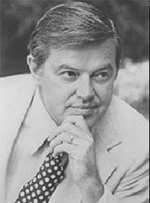- Info
A Look Back … The Church Committee Meets
The Senate's famous
"Church Committee" began its investigation of US intelligence in
April 1975. Its findings the following year would mark a watershed for the
Intelligence Community. In the Final Report, Senator Frank Church and his
colleagues concluded that the United
States needed a capability for clandestine
activities overseas and covert action operations – with proper safeguards. More
importantly, the procedures and findings of the Church Committee helped to
alter forever Congress's role in

- Senator Frank Church
overseeing the Community.
In 1975, the Senate
created the Select Committee to Study Governmental Operations with Respect to
Intelligence Activities in response to a raft of media allegations of
wrongdoing. The panel – better known by the name of its chairman, Sen. Frank
Church (D-Idaho) – interpreted its charter as a mandate to "determine what
secret governmental activities are necessary and how they best can be conducted
under the rule of law."
Church and his
colleagues prepared one of the most detailed public appraisals of any nation's
intelligence structure. The Final Report proposed changes to the organization
and management of the Intelligence Community, which echoed the recent thinking in
the executive branch. The report said the Director of Central Intelligence
(DCI) should focus on Intelligence Community affairs, and that the DCI should relinquish
direct supervision of the CIA to a deputy. The committee insisted on greater Congressional and
policymaker oversight of intelligence, and suggested amendments to the various
statutes affecting the field.
The breakthrough for
the Church Committee came in its treatment of the operational side of American
intelligence. The committee suggested that intelligence should be a collector
of data and producer of information, as well as an instrument for implementing US
foreign policy. The report concentrated on clandestine activities, but it took
a judicious approach that tempered criticisms.
It concluded that
intelligence had made "important contributions" to national security
and become a "permanent and necessary component of our government."
This conclusion countered growing public and congressional concern over the
integrity of the nation's intelligence agencies. Even covert action received a
grudging endorsement. The committee had considered "proposing a total ban
on all forms of covert action," but concluded that America should retain a
capability to react to extraordinary threats through covert means.
Within two years of the
Final Report's release, the Senate and House formed permanent committees to
oversee the Intelligence Community. While these oversight committees have
always operated within distinct limits (in part because of their competition
with the established authorizing and appropriating committees), their oversight
has had a clearly positive effect. By looking at the Intelligence Community
more or less as a whole, they have tended to make it more coherent,
disciplined, and accountable.
Posted: Mar 27, 2008 06:55 AM
Last Updated: Mar 27, 2008 06:56 AM
Last Reviewed: Mar 27, 2008 06:55 AM

